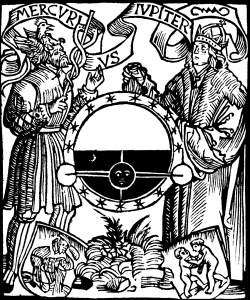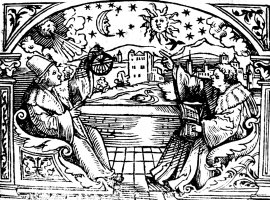Author: Jonathan Green
-
Just because they can’t see you doesn’t mean you’re not there
The call for papers for the Third Biannual Faith and Knowledge Conference for LDS Graduate Students in Religion contains a sentence that is, I think, wrong in three different ways.
-

A post-Columbian setting for the Book of Mormon
The result of writing Book of Mormon history from back to front, I think, resembles a cross between The Mission and Last of the Mohicans.
-

Looking for historicity in all the wrong places
If you think that the textual history of the Book of Mormon includes historical records, then you can’t avoid the possibility that a lot of Book of Mormon scholarship has been looking for the wrong people in the wrong place at the wrong time, and reading the wrong verses. The problem is that Book of…
-

The blotted page of the book of nature
Despite a unique cosmology that has at times inspired artistic creation for a wider American audience, there is no Mormon astrology. Someone who knew Mormonism only through its scriptural texts might be forgiven for finding this omission curious.
-

Nibley vindicatus; or Göbekli Tepe: a personal view
I fell in love almost simultaneously, as a junior in high school, with historical linguistics and Hugh Nibley.
-

How to make Mormon literature great
Glenn Beck, the soapbox orator of cable television, has done more, save Sheri Dew only, for the greatness of Mormon literature, than any other person that ever lived.
-

Dispensations
While the occurrence of a general apostasy is a matter of belief and not observable by historical inquiry, dispensations are born with a burst of documentary evidence.
-
The Songs of Lehi
If we accept, at least for the moment, that 1 Nephi has a textual history, that it drew on older sources or underwent expansion at various times, then we might wonder what could be considered the oldest layer of the text
-
The textual tectonics of 1 Nephi
My basic problem with Blake Ostler’s expansion theory is that it approaches via intellectual history what is at heart a problem in textual history
-
The formula for Nephi
In How to Kill a Dragon, the Indo-Europeanist Calvert Watkins defines formulas as “set phrases which are the vehicles of themes.”
-
Nourish and Strengthen
If you’re interested in an oral-formulaic theory of Mormon prayer, or if you want to observe a formula in its natural habitat, a good place to start would be Sunday dinner
-
Pardon my French
A brotherly reader writes: I recently had a chance to watch the new French film Banlieue 13: Ultimatum, which as far as these things go is a pretty good action flick
-
Mormon prayer and Mormon art
If you want to find a unique Mormon tradition of verbal art, you should listen to Mormons pray
-
Warbreaker, by Brandon Sanderson: a preview
With Brandon Sanderson’s Warbreaker, we have another Mormon writer of speculative fiction with something to say about marriage. Warbreaker manages to capture some ironies that won’t be lost on readers who have noted the discrepancy between the ideal of eternal marriage, and the reality of the dating scene at BYU.
-
These used to be our playgrounds
From the air, the German neighborhood where we lived until last year seems decidedly un-American
-
The TRUTH about the Book of Mormon pronouncing guide EXPOSED
The Mormon Church does not want even its own members to know how to pronounce Shimnilom
-
Relics
The Book of Mormon is a reliquary in prose. In some extensive sections and at some critical moments, what drives the narrative is the question: how did a set of golden plates, a steel sword, a ball of curious workmanship, a breastplate, and two translucent stones end up inside a stone box buried in a…
-
Now a glorious dawn is breaking
What will it be like for a marriage to continue past death into the eternities? What does it mean to have a perfected body, or to love an eternal being? Stephenie Meyer has an answer. Breaking Dawn, the last novel in her Twilight series, presents a sustained and vividly imagined view of one of the…
-
Bones
One of the subterranean threads running throughout the Book of Mormon is the mystery of whose bones are heaped upon the land northward.
-
All opposed, by the same sign
On the issues I care about (and therefore not including the topic addressed from various perspectives so eloquently by my esteemed colleagues), I prefer the positions of the Democratic Party platform and candidate. I directly benefited from Barack Obama’s work as a state senator while I lived in Illinois, he seems to know what he’s…
-
Proposition 8, the American mainstream, and the unspeakable
Most online discussions of gay marriage are not worth the effort, because no actual discussion takes place
-
Shame
Every medium has an inherent vice. While any form of media can be misused, there is a flaw lurking in the fundamental nature of each medium. Television exaggerates fear, as it transmits the worst events or most scandalous entertainment from the outside world into our homes. Movies indulge our self-deluding fantasies of escape or celebrity.…
-
Missions, art, and surveillance
One unique aspect of the missionary experience, quite distinct from life before and after, is the feeling that someone is always watching you. It’s probably the one aspect of my mission that I could have done without, although I wouldn’t say that it was entirely unproductive.
-
Foundation and Apostasy
What if the historical evidence for the foundation of the early Christian church is indistinguishable from evidence for its apostasy? What if the early church and its scriptures only arose through processes of decay?
-
Resurrection B.C.
According to an article in the New York Times today, evidence of Jewish belief in a resurrected Messiah decades before Christ’s birth may have been discovered.
-
The Temple in European Mormon Sociality
The temple plays a role in the social life of European Mormons that is significantly different in a couple of ways from the usual American experience.
